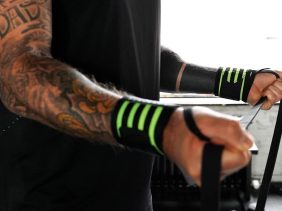After training: What to do and what not to do?
 ©Studio Firma
©Studio Firma
After a good, strenuous workout, you may find that it’s not always easy to go back to normal life. That’s because what you eat, how you sleep, and how you live after your workout will all play a part in how you feel after a training session. These are our top three dos and don’ts.
Everything you do after workout counts. The more intense your session is, the more important it will be to make the right decisions afterward. The amount that you eat and rest will determine whether or not your training yields results.
You have to workout even when you’re not working out.
Though regular exercise will generally keep your body in shape, you can’t expect one intense training session to immediately offset a weekend of debauchery. If you really want to strengthen your body, it’s important to understand that the decisions you make after your workout will need to be oriented towards your goals.
THE DOS AND DON’TS AFTER A WORKOUT.
1. DON’T: FAST. DO: SNACK.

It’s stubborn to think that starving yourself after exercise will help you burn fat. In fact, when you don’t eat enough calories, you’re more likely to lose muscle, because muscle needs energy to develop. No matter what your fitness goal is, your body needs protein-rich foods to help your muscles recover. Snacks will help you avoid cravings while giving your body the nutrients it needs.
Our protein products, like Chocolate Brownie Protein Bars and Organic Protein, are always a good choice after a workout.
If you practice an endurance activity, like swimming or running, you also need to consume enough healthy carbohydrates. They will help your body synthesize protein and give your muscles the energy they need to recover. If you want an extra serving of fiber and other nutrients, vegetables, fruit, superfoods, and whole grains are packed with them.
2. DON’T: DRINK ENERGY DRINKS AND COFFEE. DO: DRINK WATER AND GREEN TEA

Have you ever seen an energy drink with a normal-looking color? Yeah, neither have we. Most of the time, they’re basically chemical bombs. Plus, if you’re already having a snack, you might not necessarily want to consume all the calories that are often in sugary sports drinks, too. Not to mention, your cortisol level is higher after a workout, and drinking too much sugar will prevent it from returning to normal, which can have negative effects on muscle development and recovery. And the same goes for coffee. Green tea is the best caffeinated alternative.
Water is essential to cleansing your body of metabolic waste, which can be what’s responsible for a slow recovery. Drinking enough water ensures that you remain hydrated and that the nutrients you need are where they need to be in your body.
Try our Recovery Aminos for a quick and natural source of energy. They contain essential amino acids: BCAAs, which are not only essential for the body but can also contribute to muscle recovery and growth after a workout.
3. DON’T: AVOID SLEEP. DO: SLEEP WELL

Not getting enough sleep is never a good idea, because exercise strains the body, and you’re more likely to get injured during or after a workout if you’re not well rested.
Your muscles don’t just recover between workout sessions. After intense training, your body develops more muscle tissue than usual. This is called overcompensation, but it’s a process that does not work if you’re under too much pressure or stress. That’s why, if you want to recover fast, it’s best to rest, both physically and psychologically.
Sources for this article
We at foodspring use only high-quality sources, including peer-reviewed studies, to support the facts within our articles. Read our editorial policy to learn more about how we fact-check and keep our content accurate, reliable, and trustworthy.





























